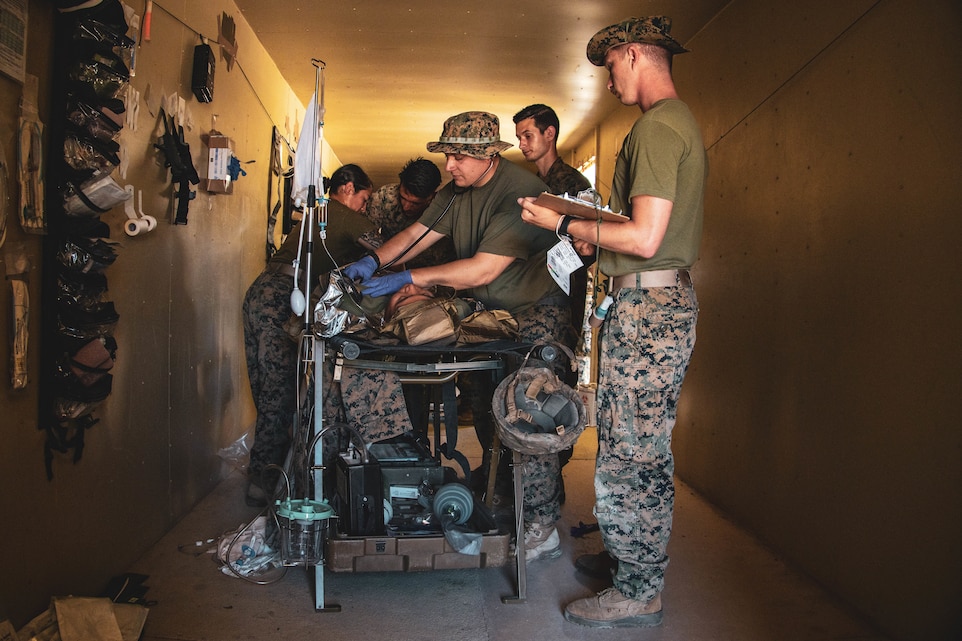
"Contact left!!" Silence gives way to screams as a routine patrol quickly turns into a casualty evacuation scenario. The sounds of simulated gunshots ricochet off the consulate's barricades as Marines and corpsmen sprint to take cover.
"I'm hit - Corpsman up!"
Teams of corpsmen with medical kits in tow race to their injured patients. They have minutes to carry their Marines to safety and provide life-saving medical care.
This is all a part of simulated training conducted during Expeditionary Medical Integration Course.
I Marine Expeditionary Force's Expeditionary Operations Training Group on Camp Pendleton developed the course to prepare Marines and line corpsmen for future deployments.
Throughout the week-long program, Marines are certified in the basics of Tier 2 Tactical Combat Casualty Care. They learn how to use the U.S. Navy's MARCH PAWS algorithm, the Navy's acronym for applying accurate prioritization of medical care, to treat a wide variety of injuries, including massive hemorrhaging, applying splints and administering antibiotics. Corpsmen get an opportunity to simulate providing care with these qualified Marines in a combat scenario, practicing moving and assessing casualties under full combat load and activating Valkyrie blood transfusions, a process corpsmen use to transfuse fresh blood from one patient to another while on the battlefield.
"Through this course we give them the opportunity to facilitate all steps of this. They're able to fulfill all the roles expected of them as a line corpsman, but in a simulated combat environment." Hospital Corpsman 1st Class, James Herkenhoff
Hospital Corpsman 1st Class James Herkenhoff, the group's training operations chief and lead petty officer for the course, said the course is an integral precursor to transitioning medical care from Role 1, treatment provided prior to surgical intervention, to Role 3, resuscitation, initial wound surgery, or specialty surgery.
"1st Marine Division does a great job of getting their corpsmen through TCCC and combat trauma management," Herkenhoff said. "Through this course we give them the opportunity to facilitate all steps of this. They're able to fulfill all the roles expected of them as a line corpsman, but in a simulated combat environment."
During the end-of-course scenario, students facilitated the evacuation of state department staff from a consulate in Cyprus. Course facilitators applied moulage, simulated injuries, to casualties ranging from bullet wounds to leg fractures. The students are not told what injuries they will be treating, but are expected to quickly determine the care each patient needs and carry them to a Casualty Collection Point under the watchful eye of evaluators from 1st Medical Battalion.
Once at the collection point, Marines assess injuries and hand off the casualties to a corpsman who provides more advanced medical care. Casualties are then evacuated by humvee or helicopter to a Battalion Aid Station where graduated medical care is administered.
"In the time period when they began to take casualties, the students were treating all of the injuries using methods such as tourniquets, prolonged casualty care, and activating Valkyrie, which has been a huge push for Division," Herkenhoff said. "They were pulling units of blood from the Marines and getting that first-hand experience of pulling Marines out of the fight to give blood."
Hospital Corpsman 2nd Class Andres Telleria, the operations officer for the course, said course developers took an array of feedback from both Marines and corpsmen during development lending to the course's success.
"I think having corpsmen take patients and train alongside the Marines in-scenario was one of the best parts of this course for us as developers," Telleria said. "The Marines were able to go through those initial life-saving interventions where sometimes a corpsman can be few and far between. Having a Marine there and having a quick and efficient turn over with a doc is huge."
"course" - Google News
May 11, 2022 at 03:06AM
https://ift.tt/QZuzVbk
Expeditionary Medical Integration Course: Unified in keeping Marines in the fight - Marines.mil
"course" - Google News
https://ift.tt/457CBoz
https://ift.tt/Etw4yKd
Bagikan Berita Ini














0 Response to "Expeditionary Medical Integration Course: Unified in keeping Marines in the fight - Marines.mil"
Post a Comment